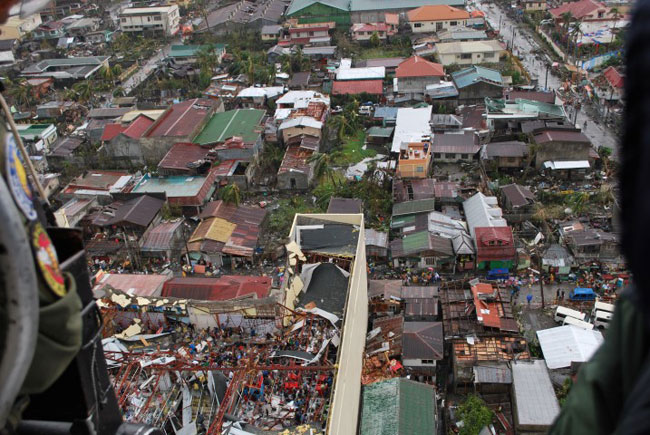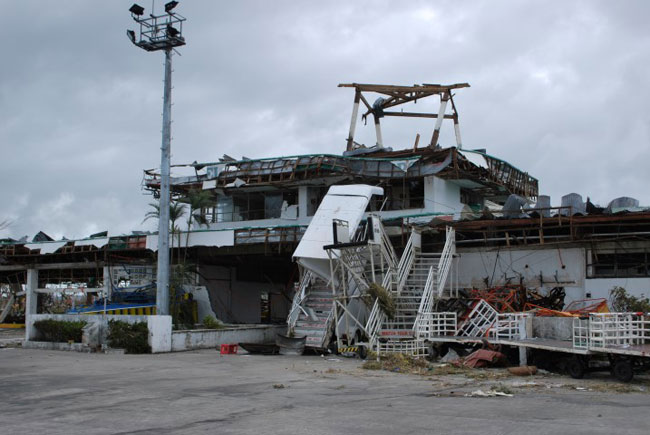Philippines: UN working around the clock to reach thousands affected by typhoon
In a statement issued by his spokesperson, Secretary-General Ban Ki-moon said he was extremely concerned by the impact of the typhoon, which has reportedly displaced more than 650,000 people and affected 9.5 million people. Some 10,000 people are feared dead, according to the World Food Programme (WFP).
Mr. Ban noted that the UN and its humanitarian partners, in close coordination with local and national authorities, have quickly ramped up critical relief operations to help some 13,000 families in desperate need.
“While many communities are very difficult to reach, with roads, airports and bridges destroyed or blocked with debris, agencies have begun airlifting food, health, shelter, medical and other life-saving supplies and have deployed specialist teams and vital logistics support,” the statement said.
Mr. Ban thanked Member States for their prompt response and urged the international community to continue to show their solidarity with the people of the Philippines.
UN emergency response teams arrived in Tacloban city within 12 hours of the disaster, one of the largest storms to ever make landfall.
“Specialist teams from Member States and humanitarian agencies are committed and mobilized, and making their way to the Philippines,” said Luiza Carvalho, Resident and Humanitarian Coordinator for the Philippines. “They are pooling resources, food and non-food items to assist the most vulnerable people.”
Relief efforts involve creating a pipeline of aid and goods distribution with deployment of relief specialists and logistic support, the UN Office for the Coordination of Humanitarian Affairs (OCHA) said.
However, unknown numbers of survivors do not have basic necessities such as food, water and medicines and remain inaccessible for relief operations. “It is vital that we reach those who are stranded in isolated areas as they are at risk of further threats such as malnutrition, exposure to bad weather and unsafe drinking water,” Ms. Carvalho said.
The WFP said it is in the process of flying food, logistics and communication equipment to Cebu airport, which will become a key hub for subsequent airlift through Government partners to Tacloban.
“The main challenges right now are related to logistics,” said WFP Representative Praveen Agrawal. "WFP is working with the Government to set up operational hubs and organize airlifts of essential supplies.”
Meanwhile, the UN Children's Fund (UNICEF) has indicated that up to 4 million children could be affected – up from the 1.9 million estimated yesterday.
“We are rushing to get critical supplies to children who are bearing the brunt of this crisis,” said UNICEF Philippines Representative Tomoo Hozumi. “Reaching the worst affected areas is very difficult, with limited access due to the damage caused by the typhoon to infrastructure and communications. But we are working around the clock to find ways to get these supplies to children as quickly as conditions allow.”
Therapeutic food for children, health kits, water and hygiene kits to support up to 3,000 families in the affected areas have already been mobilized from supplies available in the country, with distribution prioritized for the Tacloban area as soon as access is possible.
UNICEF's warehouse in Copenhagen is airlifting $1.3 million worth of additional supplies for another 10,000 families, including those affected by the recent earthquake in Bohol. The shipments contain water purification tablets, soap, medical kits, tarpaulins, and micronutrient supplements.
The agency said it is particularly concerned by children's health, due to the impact of the typhoon on water supply and sanitation systems.
“As we get a better picture of the impact of this devastating crisis, it is clear that even more children are affected than first thought,” said Mr. Hozumi. “UNICEF is doing all it can to reach these children, as quickly as possible with critical supplies, to protect their health, safety and well-being in the difficult days ahead.”








